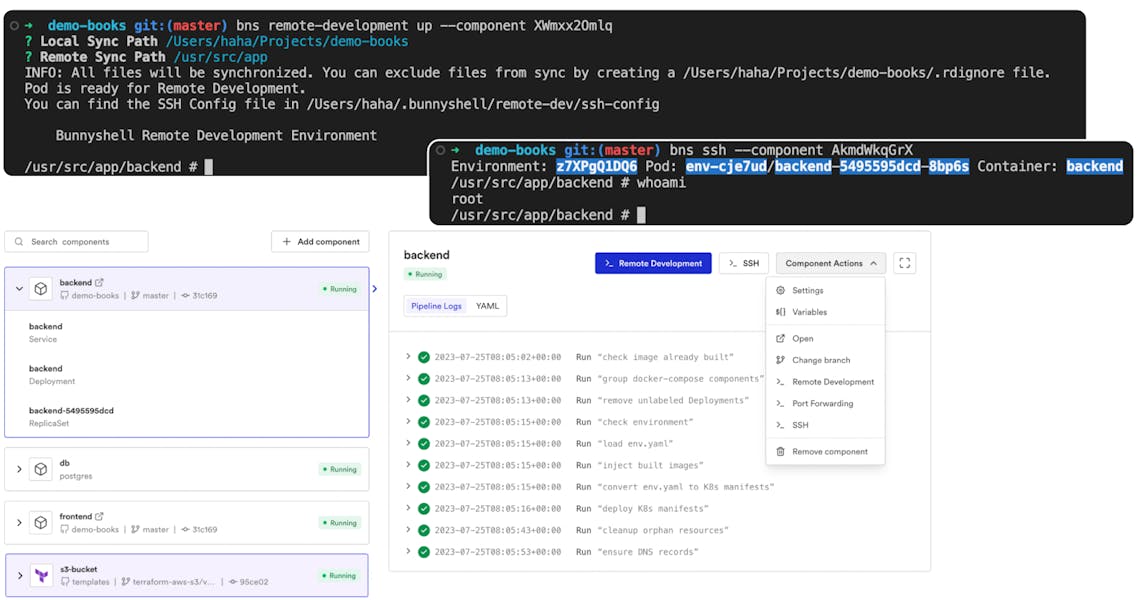Platform engineering is rapidly evolving as businesses look for more efficient ways to manage infrastructure, automate workflows, and improve developer productivity. In this edition, we’ll explore the top 10 platform engineering platforms for September 2024, optimized for scalability, automation, and ease of use. These platforms empower developers to focus on building code while platform engineers handle infrastructure with reduced complexity.
1. Bunnyshell
Bunnyshell is a leading Environments-as-a-Service (EaaS) platform designed to automate ephemeral environments for every pull request. With Bunnyshell, developers can quickly spin up self-service, cloud-native environments for testing, staging, and deploying applications. By leveraging GitOps principles, Bunnyshell ensures consistency across environments and enables faster releases. It’s ideal for teams looking to streamline development and reduce operational overhead.
Key Features:
- Automated ephemeral environments
- GitOps-enabled environment consistency
- Self-service infrastructure provisioning

2. Humanitec
Humanitec’s Internal Developer Platform (IDP) allows developers to manage infrastructure with minimal interaction from ops teams. It provides self-service capabilities, automating resource provisioning, application configuration, and environments. Humanitec is a scalable solution for DevOps teams wanting to increase deployment speed and reduce time spent on manual operations.
Key Features:
- IDP for automation
- Developer self-service
- Simplified application management
3. Weaveworks
Weaveworks is known for pioneering GitOps to manage Kubernetes clusters and cloud-native applications. The platform helps engineers deploy and manage infrastructure with Git workflows, making it easier to automate and standardize deployments across complex environments. Weaveworks streamlines application lifecycle management while ensuring better governance and operational control.
Key Features:
- GitOps-based automation
- Kubernetes and multi-cloud support
- Continuous deployment and delivery
4. Crossplane
Crossplane is an open-source platform that transforms Kubernetes into a universal control plane. It allows platform engineers to define, manage, and automate cloud infrastructure in a declarative way using Kubernetes-native tools. Crossplane integrates seamlessly with major cloud providers and simplifies infrastructure lifecycle management.
Key Features:
- Kubernetes-native infrastructure management
- Declarative APIs
- Multi-cloud and hybrid cloud support
5. Pulumi
Pulumi offers an infrastructure-as-code platform that enables platform engineers to manage infrastructure using common programming languages like Python, Go, and JavaScript. This flexibility allows teams to automate the creation and scaling of cloud environments while ensuring the infrastructure aligns with application code, making Pulumi a great choice for complex, multi-cloud architectures.
Key Features:
- Infrastructure as code with familiar languages
- Multi-cloud and hybrid cloud support
- DevOps automation
6. Terraform by HashiCorp
Terraform remains a top choice for platform engineers seeking to manage infrastructure as code. It automates the creation, modification, and destruction of resources across multiple cloud providers. With its extensive provider ecosystem and state management, Terraform is a powerful tool for automating infrastructure across clouds.
Key Features:
- Infrastructure as code
- Multi-cloud provider support
- Automated resource management
7. Platform.sh
Platform.sh is a Platform-as-a-Service (PaaS) that simplifies cloud hosting and deployment. It provides robust automation for DevOps teams, offering continuous integration and continuous delivery (CI/CD) pipelines out of the box. The platform enables engineers to focus on code rather than infrastructure management, helping teams scale applications seamlessly.
Key Features:
- Continuous integration and delivery (CI/CD)
- PaaS for simplified cloud management
- Automated environment replication
8. Red Hat OpenShift
OpenShift by Red Hat is a Kubernetes-based platform built for enterprise environments. It offers automation for container orchestration, application management, and CI/CD pipelines. OpenShift’s multi-cloud and hybrid capabilities make it a versatile solution for platform engineers working in complex environments.
Key Features:
- Kubernetes-based platform
- Container orchestration
- Multi-cloud and hybrid cloud support
9. D2iQ Konvoy
D2iQ Konvoy simplifies Kubernetes management for enterprise-grade applications. The platform integrates a full Kubernetes stack, making it easier for DevOps and platform engineers to deploy, manage, and scale infrastructure. It also comes with automated operations and lifecycle management tools, reducing the complexity of running Kubernetes at scale.
Key Features:
- Full Kubernetes stack
- Enterprise-grade scalability
- Automated lifecycle management
10. Mirantis Kubernetes Engine
Mirantis Kubernetes Engine provides robust, enterprise-level Kubernetes solutions for platform engineering. It supports multiple cloud providers and simplifies the management of containerized applications. With built-in security, monitoring, and multi-cloud support, Mirantis is a great fit for organizations looking to optimize Kubernetes operations.
Key Features:
- Enterprise Kubernetes management
- Multi-cloud and hybrid cloud support
- Built-in monitoring and security
Conclusion
Choosing the right platform engineering tool can dramatically impact your team’s efficiency, scalability, and developer productivity. Whether you’re looking for a self-service platform like Bunnyshell or a comprehensive Kubernetes solution like Red Hat OpenShift, these platforms provide the automation and infrastructure management tools needed to excel in today’s cloud-driven environment.
Explore these platforms to find the right solution for your organization’s needs, and stay ahead of the curve in 2024.
Transform Your Platform Engineering with Bunnyshell
Ready to unlock scalable, self-service environments for your team? Discover how Bunnyshell automates ephemeral environments and boosts developer productivity. Book a personalized demo today and see how we can streamline your platform engineering processes.
